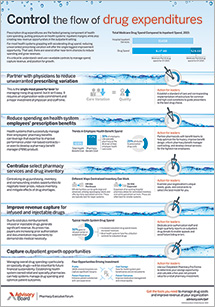Auto logout in seconds.
Continue LogoutAs fewer physicians prescribe opioids, a growing number of patients are being prescribed an injectable anti-inflammatory drug to treat their back pain—despite the drug's manufacturer warning against injecting the drug along the spine, Sheila Kaplan reports for the New York Times.
Primer: Get an overview of the current state of spine care
Background
FDA approved the anti-inflammatory drug Depo-Medrol, which is manufactured by Pfizer, for injection into a patient's joints and muscles. However, physicians, who are legally allowed to prescribe FDA-approved medications to treat any condition, have prescribed Depo-Medrol and generic equivalents of the drug for injection near a patient's spinal cord to treat back and neck pain and other conditions such as spinal stenosis.
However, according to the Times, Pfizer in 2013 asked FDA and other regulators to ban the use of Depo-Medrol injections near a patient's spinal cord, noting that the company had received hundreds of complaints about patients experiencing complications and injuries related to the injection's use near the spinal cord. Pfizer wrote Depo-Medrol "must not be used by the intrathecal, epidural, intravenous, or any other unspecified routes." According to the Times, Pfizer's request to ban providers from prescribing Depo-Medrol for a particular off-label use is unusual, but some physicians have said Pfizer in this case had concerns about being held liable for the off-label use. The Times reports that drug manufacturers do not have the same protections for off-label uses as they do for approved uses.
While FDA did not ban the epidural use of Depo-Medrol, the agency in 2014 authorized a stronger warning that steroid injections near the spine could lead to injuries or death. FDA's warning applied to Depo-Medrol and "the entire class of epidural steroid injections," the Times reports. This class of drugs is injected into the epidural space within the spinal cord, but when injection is not administered appropriately and a target is missed, patients can sustain direct injures to their nerves.
Amid opioid epidemic, providers prescribe anti-inflammatory drug for back pain
Although FDA warned against the use of steroid injections near the spine, several providers have started to prescribe Depo-Medrol, generic versions of the drug, and other similar steroid injections—rather than prescribing opioids—to treat back pain. According to the Times, "interviews with dozens of pain specialists show that pressure to wean patients off opioids is prompting many doctors to refer patients to pain intervention specialists who promote the shots."
Physicians undergo training to administer the epidural injection, which if done incorrectly could lead to serious side effects. The Times reports that weekend classes to train physicians on how to administer epidural injections have begun "flourishing."
In addition, the Times reports that the number of Medicare providers administering steroid injections—such as Depo-Medrol and other drugs—along the spine increased by 13% from 2012 to 2016 and the number of Medicare beneficiaries receiving the epidural injections for steroidal drugs increased 7.5%. Veterans Affairs saw a 17% increase in such injections from 2015 to 2017.
According to data from the IQVIA Institute for Human Data Science, the total sales of brand-name and generic Depo-Medrol increased by 35% between 2015 and 2017, from $133 million to $185million. .
According to the Times, the cost per injection ranges from $100 to $800, plus an additional fee for visiting the hospital or clinic where the injection is administered. The House in June approved a measure to raise Medicare reimbursements for the injections as part of a larger legislative package to address opioid misuse.
Reaction
Brian Yee, an anesthesiologist, said, "With people trying to take away opioids now, we are opening up another doorway for people to overutilize other options that can be helpful with the right doctors and the right patients." Yee said more general practice doctors are starting to refer patients to his clinic in West Virginia for epidural steroid injections and other procedures, including spinal cord stimulation, to treat back pain. Yee said the treatments are valuable only when they are administered properly—adding that weekend classes might not provide adequate training.
Separately, James Murphy, an anesthesiologist and substance use disorder specialist in Kentucky, said recent research suggests the injections do not work better than physical therapy, and therefore, he said, should not be prescribed so widely. Murphy added that the injections are too costly. He explained, "The physician fee is usually somewhere between $100 and $300, but the hospital fee for the procedure, the separate fee, can be anywhere from $1,000 to $5,000. That's a lot of expense for somebody when you really can't promise you're going to cure [him or her]."
James Rathmell, chair of anesthesiology, perioperative and pain medicine at Brigham and Women's Hospital, said, "The truth underlying [the trend] is that doing an injection is faster and results in higher reimbursements, compared [with] other ways of managing the same pain. The use of injections has increased dramatically, yet the prevalence of back pain has remained relatively unchanged."
Andrew Kolodny, co-director of opioid policy research at Brandeis University, added that the increase in patients receiving Depo-Medrol—and other steroid drugs—for epidural use is troubling. Kolodny said, "The victims of our era of aggressive opioid prescribing are being exploited in some cases by interventional pain doctors, who will continue them on opioids in exchange for allowing them to perform expensive procedures that they don't need. These are not benign procedures. Patients can be harmed and are harmed."
Thomas Biegi, a Pfizer spokesperson, said the company cannot track Depo-Medrol's off-label use for epidural shots and without the FDA banning such use, the company cannot prevent providers from prescribing the shots off-label. Biegi said, "We believe this is a question of medical practice and defer to clinicians and pain experts who utilize these medicines in their practices for the treatment of pain conditions" (Kaplan, New York Times, 7/31).
Access our new resources on the opioid epidemic
The opioid epidemic is a complex, multi-dimensional public health problem. Use this list of helpful resources on how hospitals and health systems can play a role to treat opioid addiction and prevent further increase in opioid abuse.
Don't miss out on the latest Advisory Board insights
Create your free account to access 1 resource, including the latest research and webinars.
Want access without creating an account?
You have 1 free members-only resource remaining this month.
1 free members-only resources remaining
1 free members-only resources remaining
You've reached your limit of free insights
Become a member to access all of Advisory Board's resources, events, and experts
Never miss out on the latest innovative health care content tailored to you.
Benefits include:
You've reached your limit of free insights
Become a member to access all of Advisory Board's resources, events, and experts
Never miss out on the latest innovative health care content tailored to you.
Benefits include:
This content is available through your Curated Research partnership with Advisory Board. Click on ‘view this resource’ to read the full piece
Email ask@advisory.com to learn more
Click on ‘Become a Member’ to learn about the benefits of a Full-Access partnership with Advisory Board
Never miss out on the latest innovative health care content tailored to you.
Benefits Include:
This is for members only. Learn more.
Click on ‘Become a Member’ to learn about the benefits of a Full-Access partnership with Advisory Board
Never miss out on the latest innovative health care content tailored to you.


